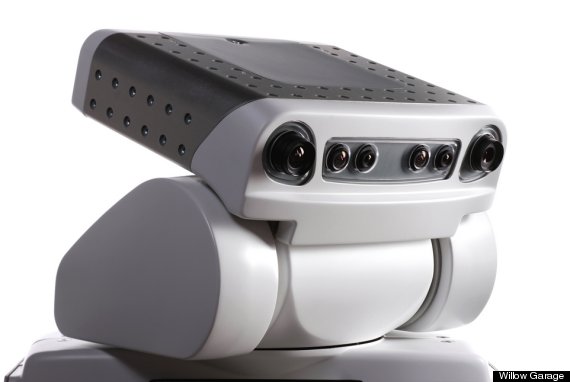
Older adults are keen on having robot personal assistants help them with laundry and housekeeping, but they draw the line at having a robot help them host a party.
A recent study from the Georgia Institute of Technology asked nearly two dozen adults between 65 and 93 to watch an eight-minute video clip showing the capabilities of Willow Garage’s Personal Robot 2, then asked the participants whether they'd prefer the robot's help or a human's in completing 48 different tasks, from "entertaining guests" to "setting the table."
Good news, humans: We're not obsolete yet.
Robots, however, may be getting stuck with some unpleasant chores. The researchers found that older adults were generally accepting of a robot housekeeper-cum-nurse-cum-companion, and preferred a robot's help to a human's for "instrumental activity of daily living" -- changing light bulbs, cleaning the house, washing the dishes, making the bed, taking out the trash, keeping pests at bay and nagging them to take their medication.
Not all chores are created equal, and the study's participants didn't trust a robot's cooking skills, nor were they thrilled about having a robot shop for groceries.
The study also concluded older adults were resistant to robot's help with more personal, intimate care, such as bathing, walking, shaving, getting dressed, eating and brushing teeth. Though a robot's help with entertaining guests got a big "no," the people surveyed "preferred robot assistance with new learning," from getting news and weather reports to teaching new skills.
"The people we interviewed were very enthusiastic and optimistic about robots in their daily lives," said Georgia Tech graduate teaching assistant Cory-Ann Smarr, one of the study's co-authors, in a press release. "They were also very particular in their preferences, something that can assist researchers as they determine what to design and introduce in the home."
The Personal Robot 2 (PR2) on which the participants' answers were based is a capable robot, but far from a friendly one. Based on previous research on human-robot interaction, it seems possible that the older adults might have given very different answers if they'd been asked to watch videos of -- or interact face-to-"face" with -- a "social robot," like MIT's Leonardo, the "Stradivarius of expressive robots."
 A headshot of Personal Robot 2, via Willow Garage
A headshot of Personal Robot 2, via Willow Garage
 A portrait of Leonardo, via YouTube.
A portrait of Leonardo, via YouTube.
"[O]ne of the things that we've learned is that, if we design these robots to communicate with us using the same body language, the same sort of non-verbal cues that people use [...] what we find is that people respond to robots a lot like they respond to people," said Cynthia Breazeal, director of MIT's personal robots group, in a 2010 TED Talk about Leonardo and other social robots.
In one of her experiments, Breazeal and a colleague tried having humans use either a robot, computer or old fashioned notepad to help them get in shape. The users who had help from a robot not only trusted the robot more than a computer dispensing similar advice, but rated its advice more highly and interacted with it more. The emotional engagement with the robot was also off the charts by comparison with the computer.
"People would name the robots. They would dress the robots," Breazeal noted. "And even when we would come up to pick up the robots at the end of the study, they would come out to the car and say good-bye to the robots. They didn't do this with a computer."
So are we sure we don't want a robot to entertain us or host our guests? Perhaps we just don't want to hang out with the unfriendly PR2. That gizmo may be stuck doing the laundry while Leonardo is by our side cracking jokes.
In case you need to entertain guests with robots soon, HuffPost's Jason Gilbert has put together a guide on how to throw a party staffed by robots.

